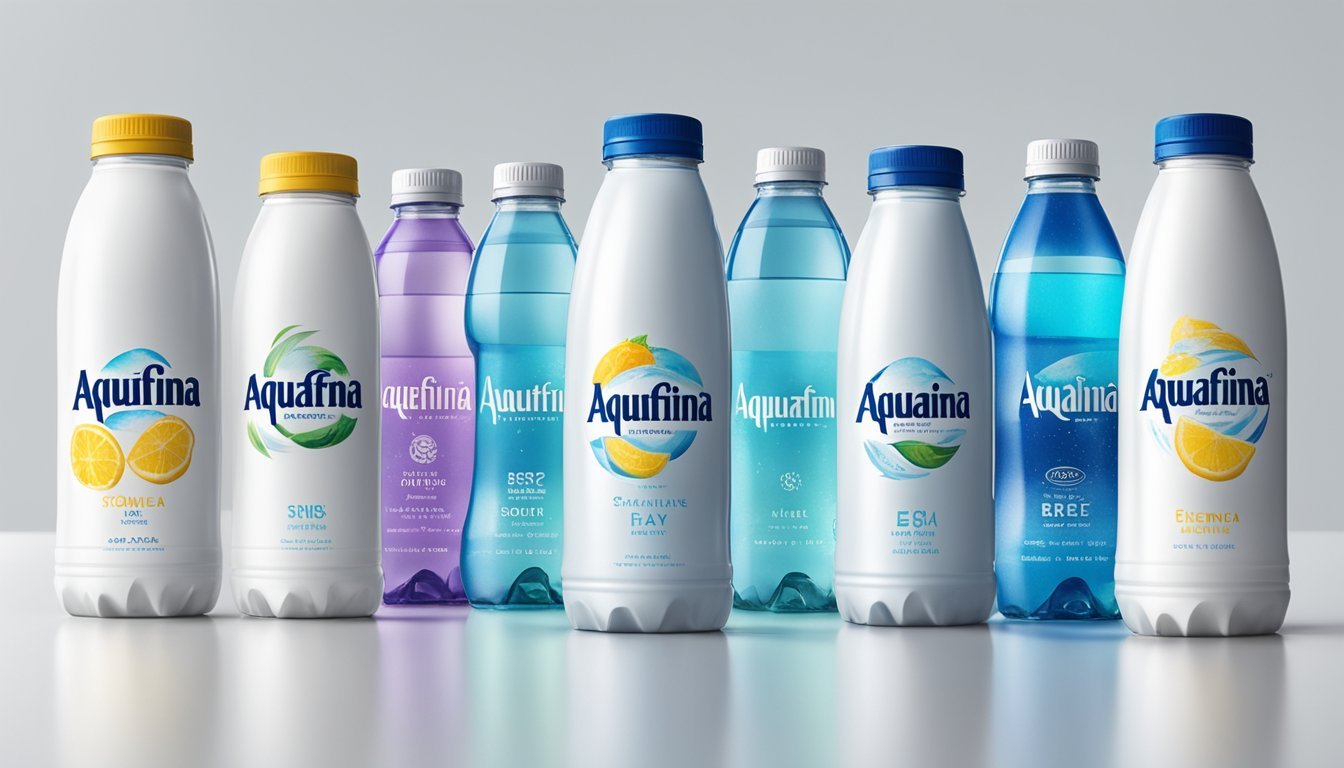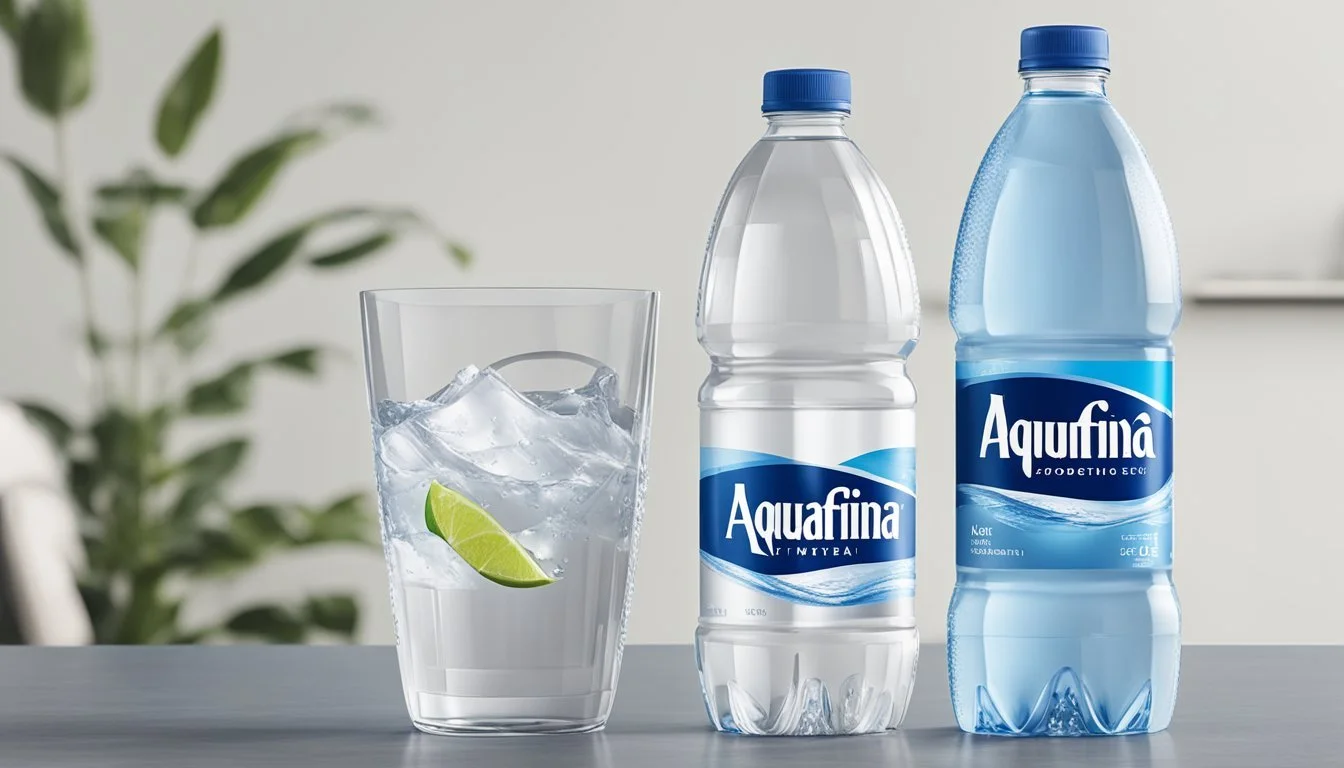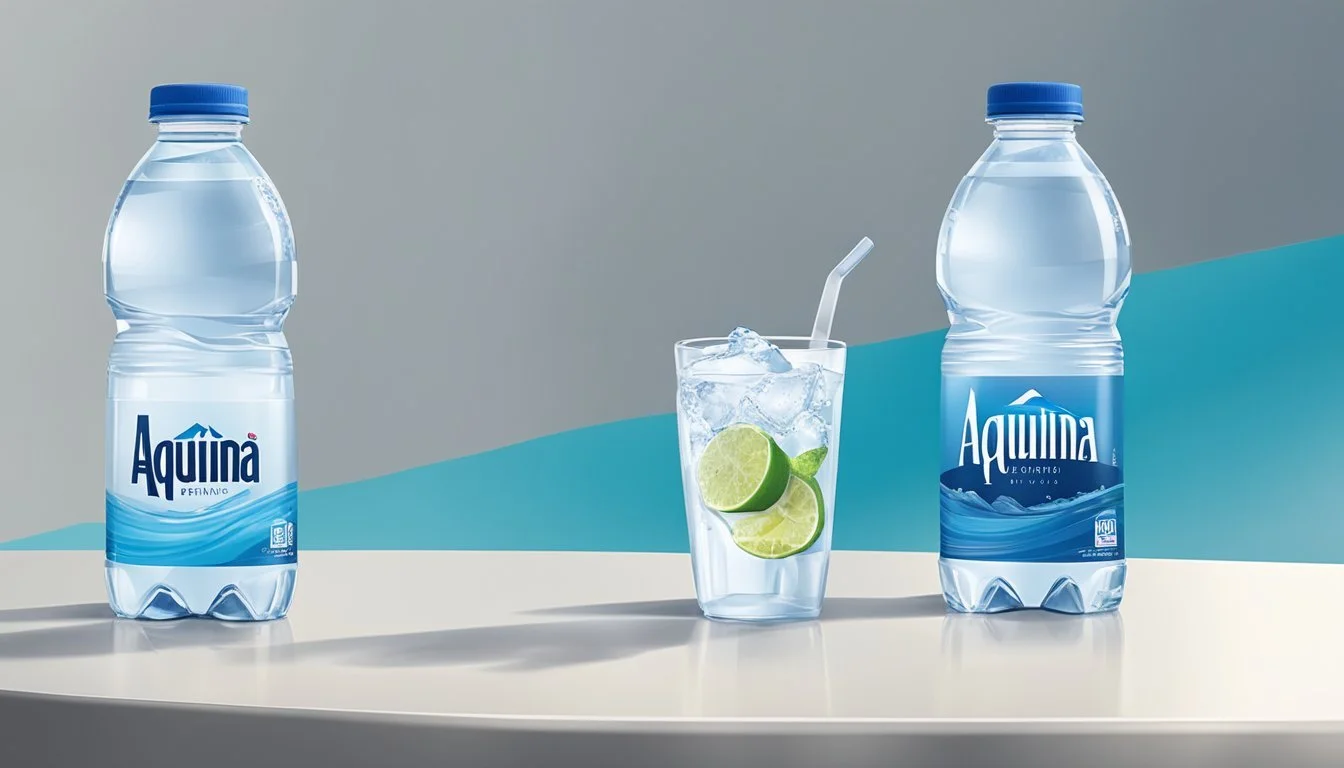Aquafina vs. Eternal
Comparing Quality and Taste in Bottled Water
Choosing the right bottled water can be an unexpectedly complex decision given the multitude of brands on the market. Among them, Aquafina and Eternal emerge as popular choices, each with its distinct sourcing and purification processes. Aquafina is purified using a rigorous seven-step process, promising purity and clean taste, while Eternal is known for its naturally alkaline artesian water, sourced from protected underground springs.
The purity of Aquafina and the natural alkalinity of Eternal bring them into frequent comparison. Consumers often weigh factors such as taste, mineral content, pH level, and the source of the water when making their choice. In the quest for hydration, some may prefer the crisp neutrality of purified water, while others may lean towards the unique mineral profile and health claims associated with natural alkaline water.
Analyzing Aquafina and Eternal in terms of their processing, source quality, and potential health benefits offers a comprehensive overview to determine which bottled water stands out. The preference for one over the other can reflect an individual's priorities, whether they be taste, health considerations, or environmental impact. This comparison seeks to provide the necessary details to make an informed choice between these two prominent bottled water brands.
Overview of Bottled Water
Choosing the right bottled water can be based on various factors such as source, treatment, and added minerals. Consumers often select bottled water for its perceived purity and convenience.
Types of Bottled Water
Spring Water comes from an underground source from which water flows naturally to the earth's surface. Purified Water is typically sourced from tap water or any other sources, which is then processed to remove chemicals and contaminants. Processes may include reverse osmosis, distillation, or deionization.
Mineral Water is water from a mineral spring containing various minerals like salts and sulfur compounds. Alkaline Water has a higher pH level than tap water, often achieved through ionization to neutralize acidity in the body.
Ionized Water goes through an electrolysis process which separates the acidic and alkaline components of water. Bottled water brands often specialize in a particular type of bottled water, like spring or alkaline, based on the treatment and beneficial properties they wish to offer.
Understanding Bottled Water Labels
Bottled water labels provide critical information about the source and type of water. Labeling regulations ensure that consumers know whether they are buying spring water or purified water.
For instance, if the label reads "mineral water," it must contain at least 250 parts per million of total dissolved solids. "Alkaline water" labels generally indicate higher pH levels, which must be reflected in the bottled water's contents.
Identifying whether water is ionized or has been through specific purification processes is also crucial. Many brands highlight their filtration methods as a selling point, differentiating themselves from basic tap water and other competitors.
Tasting Notes
When assessing bottled waters like Aquafina and Eternal, one’s palate can discern subtle nuances influenced by mineral content and pH levels. Taste test feedback often underscores these factors, lending credence to the sommelier's approach in evaluating the taste of water.
The Role of Minerals in Flavor
Minerals are integral to the flavor profile of water. Aquafina, known for its purification process, removes most minerals, resulting in a neutral taste. In contrast, Eternal naturally contains minerals like calcium and magnesium, which can impart a slight sweetness and a more pronounced taste. The mineral content is a key differentiator in flavor between these two brands:
Aquafina: Neutral, pure taste due to lower mineral content.
Eternal: Slightly sweet, complex flavor from natural minerals.
pH Impact on Palate
The pH level of water can alter its taste perception on the palate. Aquafina is often close to neutral pH (7), which aligns with the pure taste it strives for. Eternal, on the other hand, tends to be alkaline (pH above 7), giving it a smoother taste that some people find more palatable. These pH differences may be subtle but can sway individual preference:
Aquafina: Neutral pH aligns with its clean taste.
Eternal: Higher pH provides a smoother sensation.
Professional Taste Test Insights
Taste tests by water sommeliers and experts provide valuable insights into the consumer experience. They note that Aquafina, due to its purity, tends to leave no aftertaste, which can be viewed positively or negatively depending on one's preference for the presence of minerals. On the other hand, Eternal's mineral-rich profile is often perceived as providing a richer experience, lending a sense of body to the water. Professional tasters might remark:
Aquafina: Crisp and clean, with no lingering aftertaste.
Eternal: Rich and full-bodied, with a noticeable mineral presence.
Health and Hydration
When it comes to bottled water, the health benefits and hydration quality are paramount. This section assesses Aquafina and Eternal water in terms of their contribution to hydration and the presence of health-boosting electrolytes.
The Importance of Hydration
Hydration is crucial for maintaining bodily functions, and both Aquafina and Eternal offer products that can aid in keeping the body adequately hydrated. While Aquafina is purified water that undergoes a rigorous HydRO-7™ filtration process, removing substances to provide clean, crisp-tasting water, Eternal provides naturally alkaline water with a high pH level, sourced from mineral springs. These attributes make them suitable for hydration; however, the method of water processing and source can influence the water's taste and how satisfying it is for the consumer.
Electrolytes and Health Benefits
Not all bottled waters are created equal when it comes to electrolytes, which are essential for various bodily functions including nerve signaling and muscle contraction.
Aquafina does not advertise the addition of electrolytes for taste and generally emphasizes its purity and absence of added substances.
Eternal, on the other hand, naturally contains electrolytes such as magnesium and potassium chloride due to its spring source. These electrolytes can provide additional health benefits beyond simple hydration.
It is important to note that the amount of electrolytes in Eternal is likely to vary depending on the source spring, yet the presence of these minerals can be beneficial for overall health and well-being, especially for active individuals who need to replenish lost minerals through sweat.
Source and Production
When comparing bottled water brands, the origin of the water and the methods used to process it are two critical factors that significantly influence the final product's quality and taste.
Natural Sources
Aquafina water comes from municipal sources, which can then undergo a rigorous purification process. This means that the initial source is essentially the same as what you would get from a tap. In contrast, Eternal Water proudly sources its content from natural springs. The water is collected from underground springs that filter through permeable layers of ancient volcanic rock. This process naturally imbues the water with minerals and electrolytes.
Purification Processes
The purification process for Aquafina involves reverse osmosis, which strips away minerals along with any contaminants, resulting in pure tasting water. Additionally, Aquafina's water is also carbon filtered, ensuring further purity and removal of any remaining chemical compounds.
On the other hand, Eternal Water undergoes minimal processing, maintaining the natural mineral content from its passage through the volcanic rock. It does not require intensive purification like reverse osmosis since the water is already filtered naturally and boasts a high quality from the natural spring.
Both brands ensure safety and cleanliness, but Aquafina's method delivers a more consistent and neutral taste profile, whereas Eternal focuses on retaining the natural qualities and mineral content of its source.
Environmental and Ethical Considerations
In comparing bottled water brands like Aquafina and Eternal, one must consider the environmental and ethical implications of their products. These aspects play a significant role in determining the sustainability and responsibility of each brand.
Plastic Use and Ecological Impact
Aquafina, similar to many other bottled water companies, utilizes plastic bottles for packaging its water. These bottles are often made from PET (polyethylene terephthalate), which raises concerns due to their environmental impact. If not recycled properly, these bottles can contribute to pollution and harm wildlife. On the positive side, Aquafina has taken steps to reduce the amount of plastic used in their bottles, leading to a reduction in their overall environmental footprint.
Eternal Water, on the other hand, also offers its product in plastic bottles. However, there has been a growing trend in the industry towards BPA-free bottles, and Eternal has followed suit, ensuring that its bottles are free from BPA (bisphenol A), a chemical that has raised health concerns among consumers. Eternal also addresses the issue of sustainability by sourcing their water from naturally replenishing springs, which has a lower ecological impact compared to some other sources.
Ethical Sourcing and Community Impact
When it comes to ethical sourcing, Eternal emphasizes that its water is sourced from protected underground springs within the United States. This implies limited detriment to the surrounding ecosystems and the communities that rely on them. In contrast, the ethical considerations of Aquafina's water sourcing revolve around its filtration process, as the water is typically sourced from public water supplies.
The community impact of bottled water companies is multifaceted, encompassing water rights, resource management, and local economies. Eternal's approach to boxed water is an initiative that aims to offer a more sustainable packaging option, thus potentially offering reduced environmental burden and positive community implications. Aquafina, being a part of PepsiCo, has a global presence, and its impact on communities varies widely, with the brand often participating in various philanthropic efforts.
In conclusion, evaluating the environmental and ethical parameters of bottled water brands like Aquafina and Eternal is vital in understanding their overall sustainability and impact on the planet and its inhabitants.
Price and Accessibility
When comparing Aquafina and Eternal bottled water, consumers often consider two primary factors: the cost of each brand and how easily they can purchase these products.
Cost Comparison
Aquafina, produced by PepsiCo, is generally affordable and positioned as a mid-range priced product in the bottled water market. It is commonly found in a variety of packaging options which can influence price, but on average, a standard 500 ml bottle may cost under a dollar.
Eternal, which offers naturally alkaline spring water, is priced slightly higher, reflecting its positioning as a more premium product. A similar volume of Eternal water may cost approximately one to two dollars per 500 ml bottle.
Availability and Convenience
Aquafina boasts widespread availability and is typically sold in numerous retail outlets from small convenience stores to large supermarkets. This brand's extensive distribution network ensures that Aquafina can be found in most parts of the country, making it a convenient choice for many consumers.
Eternal water has a selective availability, focusing largely on health food stores and online marketplaces. While it may not be as ubiquitous as Aquafina, Eternal is still accessible to those specifically seeking out a premium water brand, albeit with potentially less convenience.
Brand Profiles
This section examines the distinct characteristics of Aquafina and Eternal and how they stack up against other contenders in the bottled water market.
Aquafina
Aquafina is a brand of purified water owned by PepsiCo, which undergoes a rigorous purification process that includes reverse osmosis, ultraviolet, and ozone sterilization. Launched in the 1990s, Aquafina has established itself as one of the top-selling water brands in the United States.
Source: Public water sources (also known as municipal sources)
Purification Process: 7-step Hydro-7™
Market Position: Competes with Coca-Cola's Dasani, Nestlé Pure Life, and Smartwater
Eternal
Conversely, Eternal offers naturally alkaline water with a high pH level that is sourced from naturally protected springs. This brand focuses on the natural purity of its product, boasting a rich blend of minerals without any artificial enhancements.
Source: Protected springs in the Shasta-Trinity Alps of California and other pristine locations
Attributes: High pH, naturally filtered
Market Position: Often compared to high pH brands like Essentia and Core Hydration
Comparison to Competitors
When compared to other notable brands, Aquafina and Eternal present marked contrasts:
Aquafina:
Aligns with market leaders like Dasani
Often preferred for its purified water offering
Eternal:
Resonates with consumers looking for natural alkalinity, similar to Evian, which originates from the French Alps, and Icelandic Glacial.
Both Aquafina and Eternal diverge from brands like Fiji Water and Voss that emphasize natural artesian sources and premium branding. Aquafina's widespread availability and competitive pricing set it apart from premium options such as Volvic and Acqua Panna. Eternal, with its emphasis on natural mineral content and a high pH, provides an alternative to those seeking hydration options with perceived added health benefits.
Safety and Regulations
When considering the safety of bottled water, Aquafina and Eternal both adhere to strict regulatory standards to ensure public health. The assessment of these brands involves understanding their compliance with safety benchmarks and the measures taken to mitigate contaminants.
Standards and Compliance
Aquafina claims its place in the market with a pledge of purity, meeting the U.S. Food and Drug Administration (FDA) requirements, which closely align with the Environmental Protection Agency (EPA) standards for tap water. The FDA monitors and enforces specific standards for bottled water, ensuring it's safe for consumption.
Quality Control: Aquafina undergoes a rigorous purification process that includes reverse osmosis, removing most dissolved substances.
Verification: Regular testing verifies compliance with federal and industry standards.
In contrast, Eternal naturally sourced from springs, does not undergo artificial purification but instead is filtered through layers of rock which naturally imbue the water with minerals, and they too must comply with FDA standards.
Natural Filtration: Eternal spring water is subject to natural purification processes during its underground journey.
EPA Alignment: Although the EPA directly regulates tap water, bottled water brands like Eternal must align with these standards as a measure of safety.
Contaminants and Public Health
Both Aquafina and Eternal are expected to maintain low levels of contaminants, a critical factor for public health. Contaminants of concern can range from bacteria and chemicals to radiation. However, both brands assure a product that abides by safety limits to avoid health risks.
Aquafina: Regular screening for toxic substances ensures that their water is free from harmful contaminants.
Eternal: With natural spring sources, Eternal commits to delivering water that is as pure as the environment it's sourced from.
Here's a comparison of the two regarding their approach to contaminants:
Brand Source Contaminant Handling Aquafina Public Water Sources Advanced purification to remove contaminants Eternal Natural Springs Natural filtration and compliance testing
Both companies ensure their bottled water is a safe choice for the consumer, aligning with stringent industry and federal standards set to protect public health.
Consumer Perception and Trends
In the bottled water industry, consumer perception significantly influences purchasing decisions. Market trends and brand loyalty play pivotal roles in determining brand superiority.
Market Trends
Market trends suggest that sustainability and health are key factors driving consumer choices. Aquafina, which is purified municipal water, has seen a decrease in popularity due to consumers' growing environmental concerns over plastic usage. Conversely, Eternal, sourced from natural springs and coming in a biodegradable bottle, aligns more with eco-friendly trends. In terms of sales, Aquafina has been a leader in the past due to its wide availability and PepsiCo's distribution network. However, niche brands like Eternal are gaining market share as consumers are increasingly valuing water quality and environmental impact in their purchasing decisions.
Aquafina
Wide availability
Previously a market leader in sales
Municipal water source
Eternal
Natural spring water
Biodegradable packaging
Gaining market share due to eco-friendly practices
Consumer Loyalty and Preferences
Consumer loyalty tends to be more fragile in the bottled water industry, as individuals are willing to switch brands based on taste, purity, and brand values. While Aquafina has a large and loyal customer base due to its consistent taste and quality, Eternal appeals to those who prefer the taste of natural spring water and value the brand's commitment to sustainability.
Aquafina
Loyal customer base due to taste and quality
Perceived as a reliable choice
Eternal
Appealing taste of natural spring water
Strong preference among environmentally conscious consumers
In summary, while Aquafina may have historically enjoyed strong brand recognition and consumer loyalty, trends indicate a significant shift towards brands like Eternal that prioritize environmental sustainability and source purity.







